|
|
|
Sort Order |
|
|
|
Items / Page
|
|
|
|
|
|
|
| Srl | Item |
| 1 |
ID:
084170
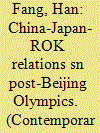

|
|
|
| 2 |
ID:
099687
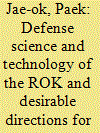

|
|
|
|
|
| Publication |
2010.
|
| Summary/Abstract |
The capacity of defense science and technology (S&T) at the level of an advanced nation is becoming an ever-more critical factor in the survival of the defense industry along with accumulation of military power. Until now, the development of advanced weapons systems and capabilities for essential technologies by the Republic of Korea (ROK) have remained at a relatively low level, due to the following factors: reliance on foreign nations for advanced weapon systems, research heavily focused on systems development as opposed to producing technologies, and a bifurcated structure of the Agency for Defense Development (ADD) managing research and development (R&D) on the one hand, and the defense industry taking on assembly and production on the other. In order to resolve this lagging in defense S&T standards, national S&T should be tied to and united with research in the defense sector; civilian resources should be astutely employed in a strategic manner; and cross-sector cooperation between the civilian and military sectors should be strengthened. Moreover, roles should be delegated accordingly between the state research facilities and the defense industries, while an R&D infrastructure based on development and accumulation of technologies should be established. The Ministry of National Defense (MND) has proposed a vision of securing "world-class defense science and technology capabilities," and this can no doubt become a most formidable and valuable security asset for the ROK.
|
|
|
|
|
|
|
|
|
|
|
|
|
|
|
|
| 3 |
ID:
101129
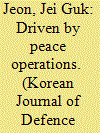

|
|
|
| 4 |
ID:
101134
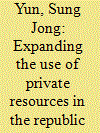

|
|
|
| 5 |
ID:
099694
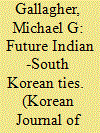

|
|
|
|
|
| Publication |
2010.
|
| Summary/Abstract |
India is an emerging great power and South Korea is a rising middle-ranking state. Both nations are democracies whose economies are increasingly intertwined. Seoul and New Delhi also share a potential problem-China. India often views Beijing as a possible enemy, while South Korean leaders have to be worried about maintaining their nation's independence in a world of expanding Chinese power. Therefore, this article will concentrate on the possibility of South Korea and India establishing a strategic relationship that goes beyond economics to include extended military ties. While analyzing the prospect for a robust strategic alliance between the two states, this paper will examine Indian-Korean economic ties, how Indians and South Koreans view China, the continued value of the Republic of Korea-United States alliance, what role Seoul's arms industry can play in India's military buildup, Indian foreign policy and strategic culture as it relates to Korea, and possible Chinese reactions to enhanced Indian-South Korean security ties. This paper's final thoughts will be that while it would be wise for Seoul to strengthen economic relations with India, it would be dangerous for South Korea to insert itself into the India-China power competition through expanded military ties with India.
|
|
|
|
|
|
|
|
|
|
|
|
|
|
|
|
| 6 |
ID:
093905
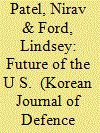

|
|
|
| 7 |
ID:
093100
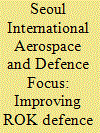

|
|
|
| 8 |
ID:
099680
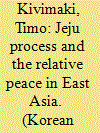

|
|
|
|
|
| Publication |
2010.
|
| Summary/Abstract |
South Korea's contribution to international peace has been on various levels, including official activities and unofficial ones. Furthermore, while its contribution has often been focused on security on the Korean peninsula, the Republic of Korea (ROK) has also contributed to a wider security environment globally and regionally. One of the major instruments of regional East Asian unofficial diplomacy has been the Jeju Process. This article focuses on the contribution of this forum to the relative peace in East Asia by first looking at what kind of activity the Jeju Process represents, and whether East Asian initiatives in general have an impact on East Asian security; or is East Asian security simply determined by global politics? Secondly, it will look at what the regional security is built on and what the main challenges are to that security. Finally, it will then look at how the types of activities that the Jeju Process represents affect the security challenges in East Asia. This paper adopts a long-term perspective and defines the security patterns and the challenges as megatrends, rather than looking at each of the immediate concerns the region has.
|
|
|
|
|
|
|
|
|
|
|
|
|
|
|
|
| 9 |
ID:
175936
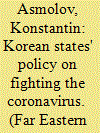

|
|
|
|
|
| Summary/Abstract |
Against the background of a protracted and arduous war on the coronavirus pandemic, the experience of countries that were able either to keep the virus out or to handle the problem with relatively few cases and deaths draws attention. In this context, both the DPRK and RoK are interesting examples, whose experiences, including comparative ones, are worth a more careful look. In both countries, the control of coronavirus has proven to be a political issue, and therefore these states have invested as much as possible in solving the problem, using all means of control according to the available technological level.
|
|
|
|
|
|
|
|
|
|
|
|
|
|
|
|
| 10 |
ID:
179557
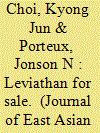

|
|
|
|
|
| Summary/Abstract |
We argue that the 2014 Sewol ferry disaster in South Korea, in which 304 passengers perished, was a result of the mode and process of privatization of South Korea's maritime police and rescue services. Through the development of a nuanced theory of privatization and use of a novel conceptualization of corruption, coupled with empirical analysis, our study shows that the outcome was symptomatic of a wider trend of systematic bureaucratic rent-seeking. A pro-active private sector ready to capitalize on the opportunity, in conjunction with a permissive political environment, resulted in a reduction of state capacity, with devastating consequences.
|
|
|
|
|
|
|
|
|
|
|
|
|
|
|
|
| 11 |
ID:
122024
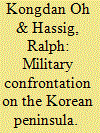

|
|
|
| 12 |
ID:
098398
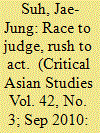

|
|
|
|
|
| Publication |
2010.
|
| Summary/Abstract |
On 26 March 2010, the Republic of Korea (ROK) Navy corvette Cheonan broke in half and sank near Baekryong-do Island off the coast of North Korea. Forty-six sailors lost their lives. Mysterious as the cause of the incident is, the ROK government's responses-the Navy's failure to communicate through the chain of command, the military's incompetence in rescue and salvage operations, the Ministry of National Defense's efforts to cover up basic facts, and the government's rush to blame North Korea as the culprit and take punitive measures-all added confusion and heightened already high tensions on the peninsula. This articles argues that the ROK government's report failed to substantiate its claim that North Korea attacked and sank the ship. Moreover, the author shows, its claim was based on internally inconsistent logic and likely fabricated data. The government's rash, and unsubstantiated, judgment was accompanied by saber-rattling against the North and scare tactics intended to silence domestic critics immediately before local government elections. Amidst the heightened tension caused by the incident, the U.S. administration succeeded in pressuring the Japanese prime minister Hatoyama to cave in to its demand to keep the Futenma base within Okinawa. Also it agreed to postpone the transfer of the wartime command control over the Korean military to the ROK until 2015. The United States, economically wounded by the financial crisis of 2008, found the heightened state of insecurity created by the Cheonan incident an opportune excuse to strengthen its allies and its military, if not political, influence in Northeast Asia, although its success may prove Pyrrhic in the long run.
|
|
|
|
|
|
|
|
|
|
|
|
|
|
|
|
| 13 |
ID:
120350
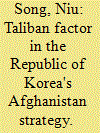

|
|
|
| 14 |
ID:
099683


|
|
|
|
|
| Publication |
2010.
|
| Summary/Abstract |
Japan and the Republic of Korea are the United States' two most important allies in East Asia. Although U.S. alliances with those countries have succeeded in maintaining peace and stability in Northeast Asia, it is not clear how effective they would prove to be should they be tested by a major incident originating, say, in North Korea, because South Korea-Japan relations are troublesome. The issues that divide these two countries, based on strong and long-standing emotional attitudes that are resistant to change, largely revolve around Korean perceptions that the Japanese have not sufficiently recognized and apologized for past aggression against their neighbors during the first half of the twentieth century. For its part, the United States can improve trilateral relations by avoiding foreign policy decisions that make other countries nervous, such as decisions based on the principle of preemptive attack. A resumption of trilateral security dialogue is also needed. The U.S. alliances with Japan and South Korea must be preserved to keep the peace in Northeast Asia, and it is important that politicians and government officials in Korea and Japan adopt a strategic view and not let emotional issues stand in the way of pursuing the best interests of their respective governments.
|
|
|
|
|
|
|
|
|
|
|
|
|
|
|
|
|
|
|
|
|